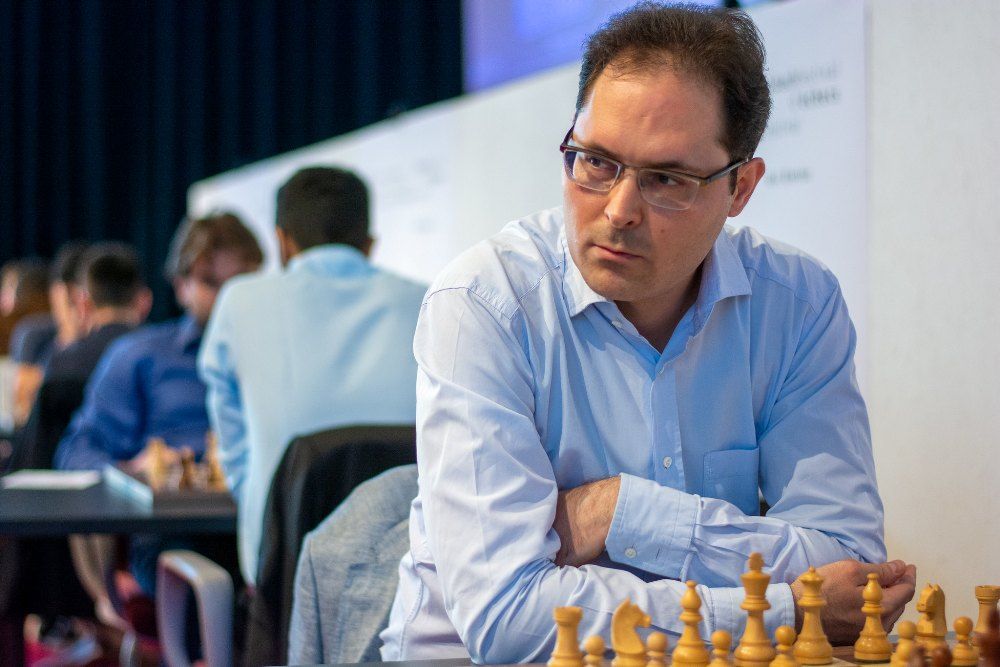


Winning starts with what you know
The new version 18 offers completely new possibilities for chess training and analysis: playing style analysis, search for strategic themes, access to 6 billion Lichess games, player preparation by matching Lichess games, download Chess.com games with built-in API, built-in cloud engine and much more.
From 10 to 23 September, the Hungarian Chess Federation will host the 45th FIDE Chess Olympiad. The major international tournament will take place in the BOK Sports Hall in Budapest, which can accommodate 10,000 spectators. Although not quite as many chess fans are expected, the Chess Olympiad, which is the second largest sporting event in the world in terms of the number of participants, is sure to attract a great deal of attention in Hungary. However, after it was announced that the 45th Chess Olympiad would be held in Hungary, the host association suffered a setback.

Richard Rapport | Photo: Mark Livshitz
Their top player, Richard Rapport, had followed the call of money and been lured by a Romanian sponsor to join the Romanian Chess Federation. Naturally, the Hungarian Federation wanted to build on the achievements of earlier days and compete for a medal with a strong team in their own country. In this sense the loss of their best player was not good news. In fact, Rapport was also offered Romanian citizenship, but the grandmaster, who was born in 1996 in Szombathely in western Hungary, declined the offer.
The association, which has been led by philosopher, doctor of economics and deputy state secretary Dr Zoltan Polyanszky since last year, has now succeeded in bringing its best chess player back to Hungary.
Richard Rapport to play for 🇭🇺 Hungary at the Budapest Chess Olympiad this September!
— International Chess Federation (@FIDE_chess) May 28, 2024
Rapport returns to Hungary after two years of representing Romania. The federation is thrilled to have him back and is strengthening its team as hosts of the upcoming Olympiad. Peter Leko will… pic.twitter.com/smqBYTshLw
At the same time, the Hungarian Chess Federation also tried to persuade 2004 World Chess Championship runner-up Peter Leko to return to the chessboard. Leko thought about it for a long time and made it a condition that Rapport should also play for Hungary again.

Peter Leko | Photo: Simon Bohnenblust
In the end, both top players agreed to take part. The last time they both played for the national team was ten years ago at the Chess Olympiad in Tromsoe, where they won the team silver medal. Judit Polgar also played for her country at that time, but the best female chess player of all time has definitely retired from tournament chess. However, the team has gained another top player in Sanan Sjugurov, who has moved from Russia to Hungary. Behind Sjugirov and Leko there are five players with an Elo rating of over 2600 to choose from for the remaining places in the team. Without Rapport, Hungary was eleventh in the FIDE country rankings based on the average rating of its best players. With the return of its top players, the country will improve even further.
Hungary has a great chess tradition going back at least to its legendary world class player (1805 to 1857) Joszef Szen. Szen was considered one of the best players in the world in his day and was one of the participants in the famous London Tournament of 1851. Born in Pest, he founded the Budapest Chess Club (Pesti Sakk-kör) in 1839. At the end of the century Geza Maroczy (1870-1951) took over the role of the best Hungarian chess player and world class grandmaster.
The list of Hungarian world-class chess players is long and includes, in addition to the names mentioned, names such as Johan Löwenthal, Otto Blathy, Andor Lilienthal, Laszlo Szabo, Pal Benkö, the multiple world championship candidate Lajos Portisch, Zoltan Almasi and the famous Polgar sisters. The First Saturday tournaments in Budapest are popular for gaining norms. Many top players earned their first spurs here.
The Federation also has a long history. The first Hungarian Chess Federation was founded in 1911 by Daniel Huber and Geza Maroczy, but it was dissolved in 1913. After the First World War a new federation was founded in 1921. After the Second World War it was re-established in 1945 as the Workers' Chess Federation, but from 1956 it took the name of the Hungarian Chess Federation (Magyar Sakkszövetseg).
In the course of history, Hungary has won twelve medals with its team at the Chess Olympiads. In 1978, the Hungarians even beat the USSR team to win the gold medal in Buenos Aires.
| Advertising |